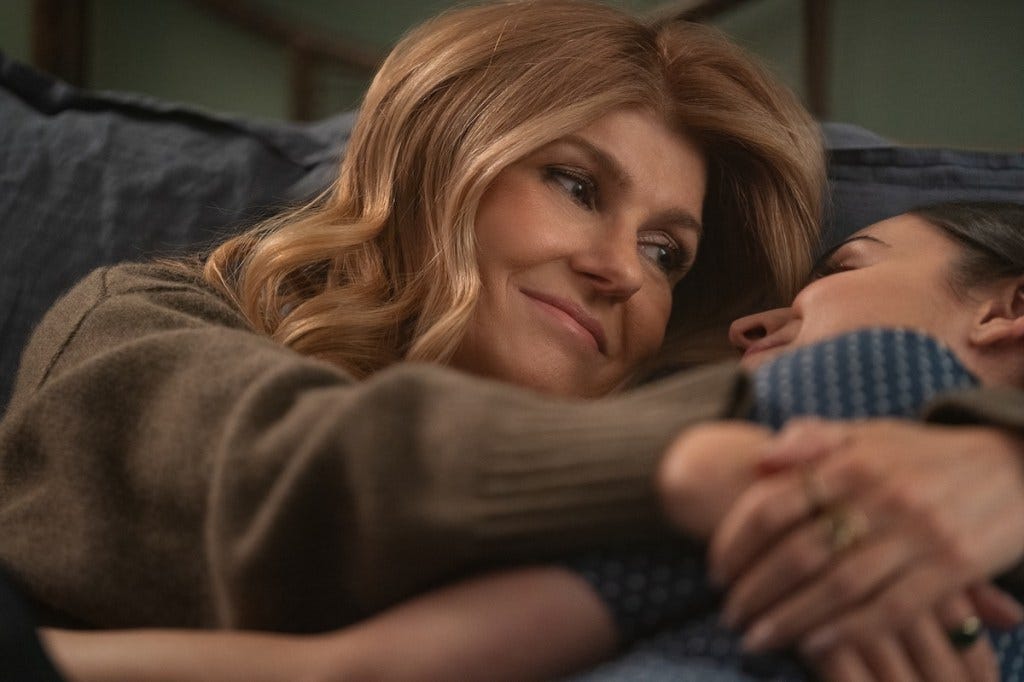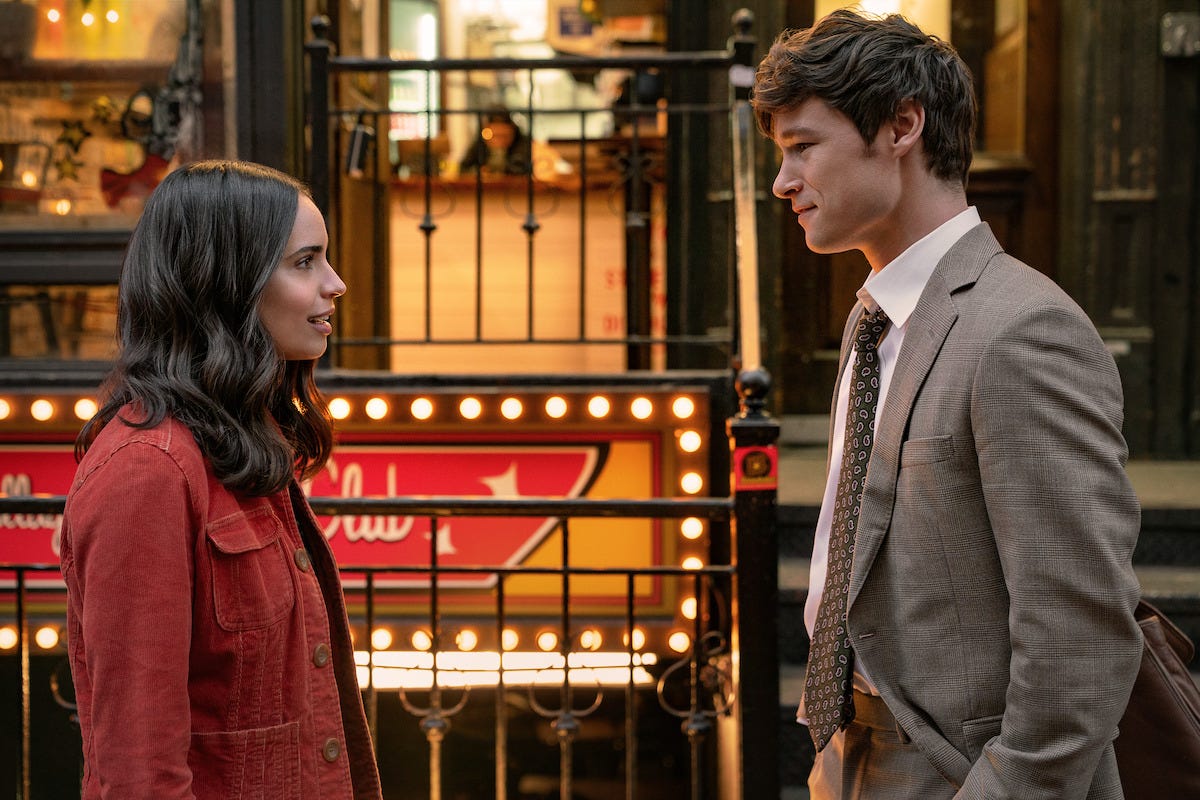“The Life List” Isn’t a Perfect Movie, But It’s Exactly What I Needed
Like the Netflix film’s main character Alex, I’m grieving a family member and trying to get myself out of a rut. Though I don’t have the ghost of Connie Britton helping me out.
[And we’re back! I can’t make any promises as to the future of this newsletter, but I felt moved to write this after crying continuously throughout the last 20 minutes of this movie. And yes, I know it’s a movie, not a TV show.]
Did Netflix deliver me the exact movie I needed for my current mental state?
“The Life List,” which debuted on March 25 on Netflix starring Sofia Carson, Kyle Allen, and Connie Britton – and currently the #2 most popular movie on Netflix – pulled at my heartstrings in the best possible way. One part family drama, one part rom com, one part coming-of-age movie, it follows Alex (Sofia Carson, reminding of a younger Cristin Milioti), the youngest daughter of Elizabeth (Connie Britton), who early in the film dies of cancer. Instead of a straightforward will she sends her daughter on a quest to achieve her childhood dreams from beyond the grave. Elizabeth challenges Alex to achieve a list of life goals she wrote when she was 13, which she found while going through old keepsakes. Entering the picture is their conveniently attractive estate lawyer Brad (Kyle Allen, who could be Glenn Powell’s younger brother), who helps out with the challenge by handing off the DVDs that Elizabeth made to give Alex after she checks off each subsequent item on the list.
It’s a slightly convoluted premise and not entirely realistic, but it’s a worthy setup to a charming, touching, and hopeful film, and it’s just what the doctor ordered.
Like the protagonist, I am going through a period of upheaval and loss. In late January my older brother Philip passed away, after a lifelong battle with Duchenne muscular dystrophy. Though we had a different relationship than parent and child, of course, I have been trying to think about what he’d tell me in different scenarios I’ve been facing, what advice he’d give, what he would do. In “The Life List,” Alex actually has access to recordings her mom made before her death, sharing bits of wisdom and even dialogue with her daughter. I found it really touching how Alex responds to the video recordings out loud, as if they are still in conversation, demonstrating their close relationship. At one point in one of the recordings, Elizabeth starts saying the quote “What dreams may come when we shuffle off the mortal coil must…” and forgets the rest momentarily, Alex instinctively fills in “must give us pause,” from Hamlet, which they say together.
At Philip’s memorial, we did a ritual where everyone added a bit of soil and water to a jade plant. As we did so, the chaplain instructed us to think about what qualities from Phil we’d like to carry on as our own. I chose fortitude. Against any challenges he faced, it would never occur to him not to push on. With his severe disability, surviving itself required gumption and determination beyond what many will require in their entire lives.
I have tried to hold these qualities of Phil in me in the months since his passing. While the film doesn’t focus so much on grief, one of the best scenes of the movie involves the three siblings together, in their mom’s old house, reliving childhood memories, laughing, crying, and most importantly being together. Their relationship is changed by their loss, but also reified. Experiencing death and grief together they become more liberated to express their true feelings. Barely two months out, it remains to be seen how our lives will all be changed. It is all still in flux, and of course our lives aren’t a movie. But there is truth to be plumbed there, anyway.
The movie explores what love means, especially through Alex’s strained relationship with her father, who’s carrying an explosive secret. That twist is not the most realistic or even necessary plot development in the film, but the relationship challenges the viewer to reconsider what love looks like, and what even makes a family. My family looks different now – Philip is no longer alive, but he is still with us, and his memory irrevocably connects not only my parents and me but Philip’s life partner Pilar and their dog PupPup, as well.
I have been trying to figure out what Philip would want for me, without the benefit of a set of DVDs telling me (from the great Connie Britton, no less). Like the protagonist at the start of the movie, I am feeling lost. In the last six months, I moved back to New York from California, went through a sudden but inevitable ending to my seven year relationship, experienced the loss of my brother and have been job hunting amid the terrors of the second Trump administration. I am trying to find a job where I can do good and help people, which is also Alex’s goal. But within my narrow niche of experience, skill, and ability, in a competitive and uncertain job market, it isn’t totally clear to me that this is possible anymore. After a lifetime of knowing I’m best suited to writing and editing about causes I believe in, now it feels like my professional future is totally unknown. I’m sure I am hardly alone in these existential fears in a time like this.
So the conversation Alex has with her mom early in the movie resonated with me, too. Elizabeth says that she thinks Alex is “floundering” and “feeling a little lost.” She’s left her passion job in teaching and is now working at her mom’s company, though her mom wishes she’d go back. “It’s not who you are. It’s not what you’re passionate about,” Elizabeth says.
“Passion is overrated,” replies Alex. “It is. It never lasts, and it’s completely exhausting. Besides, isn’t that what my generation’s all about? Lowering expectations and letting go of childish dreams?”
Feeling unmotivated from grief and restless watching the world fall apart, living alone for the first time in my life, you could say I feel more than a little lost. Like there’s no solid ground to hold onto, even if I sound like I’m doing okay, or am pretending, for a couple hours, like everything is normal.
I am trying to be patient with myself as I work on a larger writing project about Philip. I try to think of how Philip would support my career goals, and how he’d urge me to be kinder to myself, though he wouldn’t sugarcoat things.
Watching Alex go through challenges with her career but ultimately figure things out, though it looks different than she imagined, gave me a glimmer of hope that perhaps given a bit more time, and patience, things could fall into place for me too. She finds her way in part by doing things that scare her, and that are difficult, like doing a stand-up bit at a comedy club or playing in a piano recital in which she is the only adult. In a time like this, I feel fearful and risk-averse. Depression is not conducive to confidence in oneself. But I found Alex’s bravery inspiring. Plus, New York, and Brooklyn especially, is everywhere in this movie, yet another parallel with my life.
Alex also has several relationships in the movie. She takes her mother’s wisdom into these too as she searches for her “one true love,” the last item on her life list. Though I can’t say it’s not predictable, I did think the movie had more nuance about relationships than many that see “good” and “bad” relationships in a sort of black-and-white paradigm. There are many good things about her relationships in the movie that end, but these men just aren’t a good match for her when it comes down to it. This too resonated with me as I look back upon the various ways I settled in my previous relationship. “Honey, settling is never gonna make the fear and pain go away,” says Elizabeth in one of her recordings.
Movies of course present simplified, idealized versions of things but here there was more than a kernel of truth. The main romantic pairing in the movie had a natural rapport that reminded me a little of “Set It Up,” though maybe with a tad too large a serving of Manic Pixie Dream Girl. In terms of tone, it also brought last year’s surprisingly gut-wrenching “My Old Ass” to mind.
Though it’s a small part of the film, I also appreciated the nods to Alex’s family’s Latinx heritage through her father, Samuel (José Zuñiga) and the character of Johnny (Jordi Molià), who at one point sings a rendition of Natalia LaFourcade’s “Hasta La Raíz” that brought me to tears. (Sofia Carson, who plays Alex, is herself Colombian-American.) I would’ve liked to see more specificity in this portrayal, and more of it, especially in a time when diverse representation is under attack. But as a longtime Natalia LaFourcade fan, I was excited by the reference.
“The Life List” felt much more robust than many of the so-called rom coms and dramedies coming out lately, and movies coming out on streaming platforms in general. A lot of recent content has followed a disturbing trend of shows that are meant to be watched while multitasking. But this movie had enough layers, plot, characters, suspense, romance and heart to hold my attention. And because it had a lot of characters, that space to breathe felt necessary. Though some might say it is a bit long, I appreciated the opportunity to sink into the film and let it develop rather than worrying about an abrupt end.
I cried continuously through the last 20 minutes of this movie. But it was good crying, the kind I needed, that left me sad and missing Philip but with a glimmer of light and hope, too. It made me think that maybe rather than fear I should locate somewhere within myself boldness and fortitude.
If you feel so moved, donate to his page on Parent Project Muscular Dystrophy.




